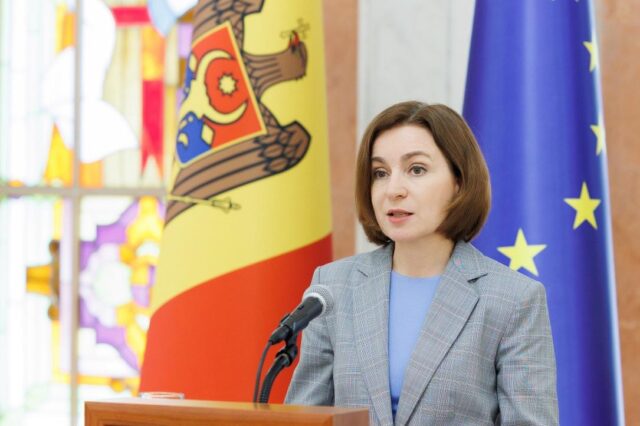
Chisinau Has More Work to Do in Convincing Citizens to Support European Integration
Publication: Eurasia Daily Monitor Volume: 21 Issue: 4
By:

Moldova’s ruling Party of Action and Solidarity (PAS) is setting the stage to hold a national referendum on the country’s EU membership this fall, on the same day as the planned presidential elections (Deschide.md, January 10). This follows President Maia Sandu’s recent announcement that she will run for re-election while demanding that the referendum occur concomitantly (Moldova.EuropaLibera.org, December 27, 2023). The referendum comes as a political redundancy. PAS already applied for EU membership in March 2022, and the European Union granted Moldova candidate status in June 2022. Most recently, Brussels agreed to open accession talks with Chisinau at the end of last year (Euronews, December 15). A more likely explanation for this move is that Sandu intends to instrumentalize the referendum to lure to the ballot boxes the Moldovan diaspora living in the West, whose active participation was critical in bringing her to power in the 2020 elections. This suggests that PAS is concerned about the possible risk of low turnout for pro-EU voters, which would increase the chances of Russian political proxies in Moldova winning the election.
These concerns are not groundless. While the European Council voted in favor of opening accession negotiations with Moldova, popular support for EU accession within the country has been on the decline. The polling data reveals a sad truth: Chisinau has done a better job convincing EU officials in Brussels that Moldova should join the 27-member bloc than its own citizens. The Moldovan government has largely acted under the assumption that most of the population understands the benefits of EU membership. This partially explains why the current Moldovan leadership has paid little attention to employing a public campaign to promote EU accession within the country while spending tremendously on external efforts. As a result, Chisinau’s policy of deepening integration with the European Union comes off as an elitist endeavor, driven more by the ruling party and portions of the intelligentsia than a strong grassroots movement.
The ruling PAS has been one of Moldova’s most pro-European political forces. During its time in government, however, popular support for EU integration has been gradually decreasing. According to the Chisinau-based Institute for Public Policies (IPP), support for EU membership jumped to 65.2 percent in late 2021 following PAS’s victory in the parliamentary elections, possibly due to the population’s high expectations. That rate dropped to 50.9 percent and 49.7 percent in 2022 and 2023, respectively. In contrast, public support for integration with the Russian-led Eurasian Economic Union (EAEU) has grown under the PAS government—from 25.8 percent in late 2021 to 30.2 percent in 2022 and 32.8 percent in 2023 (Ipp.md, accessed January 11). The increased support for EAEU integration has likely been driven by a combination of PAS ignoring the domestic audience in favor of foreign ones and an increase in the intensity of Russian influence operations within the country.
The spike in the effectiveness of Russian influence operations is reflected in Moldovans’ perceptions of Russia’s war against Ukraine. IPP survey data indicates that, from November 2022 to August 2023, the public’s belief that Russia launched an unjustified aggression in Ukraine decreased from 38.3 percent to 33.4 percent. During the same period, those that supported the notion that Russia’s full-scale invasion of Ukraine was launched “to defend the people’s republics in Donbas and Luhansk against Ukraine” and “to free Ukraine from Nazism” increased from 32.2 percent to 35.1 percent.
The Moldovan public’s support for integration with the European Union may be even smaller than some data demonstrates. When respondents were asked to choose between voting for EU or EAEU membership, support for EU accession dwindled (Ipp.md, accessed January 11). In a set of surveys conducted by the International Republican Institute last year, “strong” support for EU membership was 38 percent in 2021, slightly dropping to 36 percent in 2022 and 2023. Another 26 percent of respondents “somewhat supported” EU membership in 2021, seeing a marginal increase to 27 percent in 2022 and 2023 (IRI.org, September 11, 2023).
The up-and-down variation suggests that Moldovans’ support for the European Union is less resilient than Chisinau may think. This, in turn, means that public opinion is susceptible to pro-Russian propaganda. The 2023 World Values Survey revealed that Moldova recently scored the highest on “survival” values and lowest on “self-expression” among European countries, reflecting the lowest levels of public trust. It also showed a visible shift of Moldovans toward more traditional values, which include deference to authority and conservative family values (Economist.com, August 3, 2023). This implies that Moldovans are less likely to engage in high-risk and high-cost behavior to challenge an authoritarian regime. That logic has been confirmed in recent history. For example, when Moldovan now-fugitive oligarch Vlad Plahotniuc refused to accept the election results demoting his party from power in 2019, a justice-seeking public did not force him out, but by the concerted efforts of the United States, the European Union, and Russia (see EDM, June 10, 2019). That reality likely means that if a pro-Russian force comes to power after the 2025 parliamentary elections, a Moldovan-style Maidan is unlikely. Suppose a pro-Russian government comes to power and withdraws from the accession negotiations with the European Union. In that case, most public servants in Moldova will likely stay in their positions and abide by that decision. That means the current political and civic commitment to EU integration in Moldova is reversible.
Moldovans are not intrinsically more Euroskeptic than the average European. They are, however, significantly more exposed to Russian influence operations and more likely to be manipulated by Moscow’s propaganda. As a result, Chisinau and its Western partners must actively implement a more comprehensive, continuous, and country-wide dialogue to engage the whole Moldovan population better to consolidate public support for the country’s European integration.



